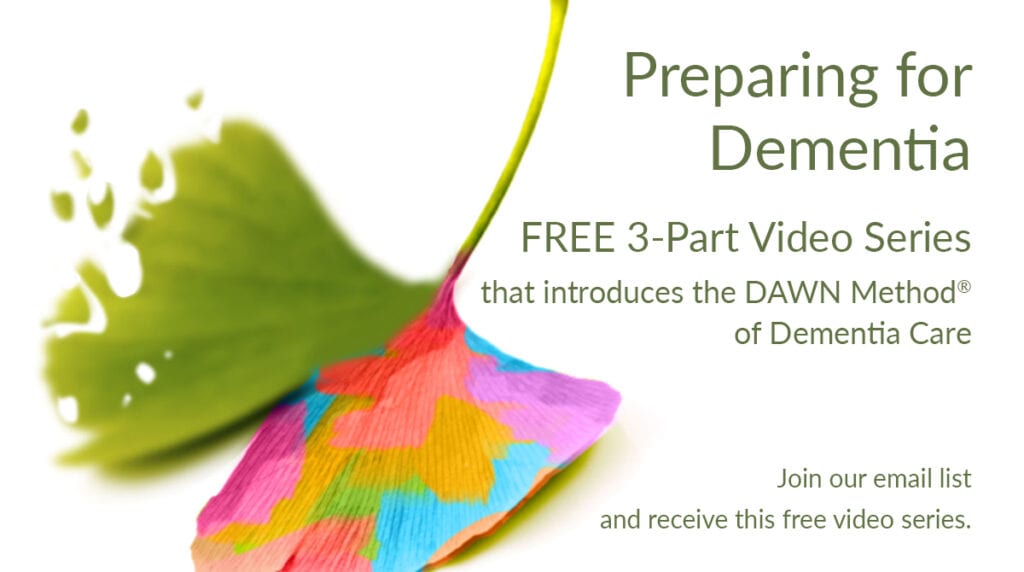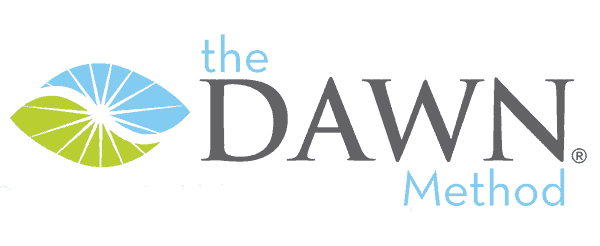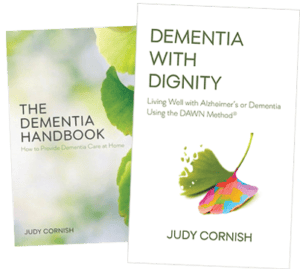(This article was first posted in the National Council of Certified Dementia Practitioners’ newsletter, November 2020 edition.)
My background and how the DAWN Method of dementia care began.
Mom keeps losing her car so we’re going to have to put her in a care facility. She can’t live alone anymore.”
Those words caught my attention. ‘Mom’ was my neighbor, a woman in her late sixties with white curls, a quick smile, and a wry sense of humor. From talking with her over her tomato plants, I knew she was a widow who had been an after-school teacher, an artist, and an ardent supporter of her community. She often told me that she didn’t like gardening—that her late husband had been the gardener—but that she did like eating green beans and tomatoes. I chatted with her in her front yard because she would assign herself half an hour each day to plant, water, and weed.
And I knew a little about care facilities. Before I attended law school, I’d worked for a year in a residence for the mentally ill in the same building as an Alzheimer’s unit. Our residents had us (a team of psycho social skills trainers) as well as a psychologist, but the 97 residents on the other side of the locked door had no one but an aide or two and a nurse to meet their needs. I went to law school haunted by the suffering I heard and saw in that Alzheimer’s unit that year. I didn’t find a way to do anything about it through practicing law, but a way found me that summer evening when my neighbor’s daughter came by.
I couldn’t bear to think of her mother in a care facility, so I offered to help. That was the beginning of the Dementia & Alzheimer’s Wellbeing Network (DAWN) and the birth of the DAWN Method. Helping one neighbor quickly grew into helping several, then many. My law practice was put on hold while I learned how to work with clients whose needs were entirely different from any I’d seen before. And, although I had no idea at the time, in learning how to care for someone who’d lost cognitive skills, I began a journey of personal growth. My books and training programs share what I learned from my clients during those five years when I spent most of my time with people who were living at home, alone, with dementia.
I needed to learn how to help them function safely—and feel successful and safe—even though they were losing skills.”
But that fall, I was an attorney with no experience in social work or the medical field, and no formal training in working with dementia or Alzheimer’s. I knew that to experience dementia meant to become forgetful, and that Alzheimer’s was a form of dementia. I knew that working with people who were experiencing dementia was extremely stressful and difficult, that families struggled and failed and that agencies and facilities had high staff turnover. And I knew the suffering I’d seen in the only Alzheimer’s unit I’d been inside.
How my new friends with dementia taught me
I didn’t want to respond to my new clients in the same way I had seen people treated in that Alzheimer’s unit, so I let them show me what they needed. Very quickly I realized that medical training and knowledge of disease were not what I lacked; what I needed was to understand how their cognitive skills were changing so I would know what they could still do. I needed to learn how to help them function safely—and feel successful and safe—even though they were losing skills. During that first winter, as I worked with more and more people living in their own homes with dementia, I began to see a pattern in what they were experiencing. Recognizing that pattern enabled me to help them get through the day without embarrassment or frustration, and our times together became more enjoyable.
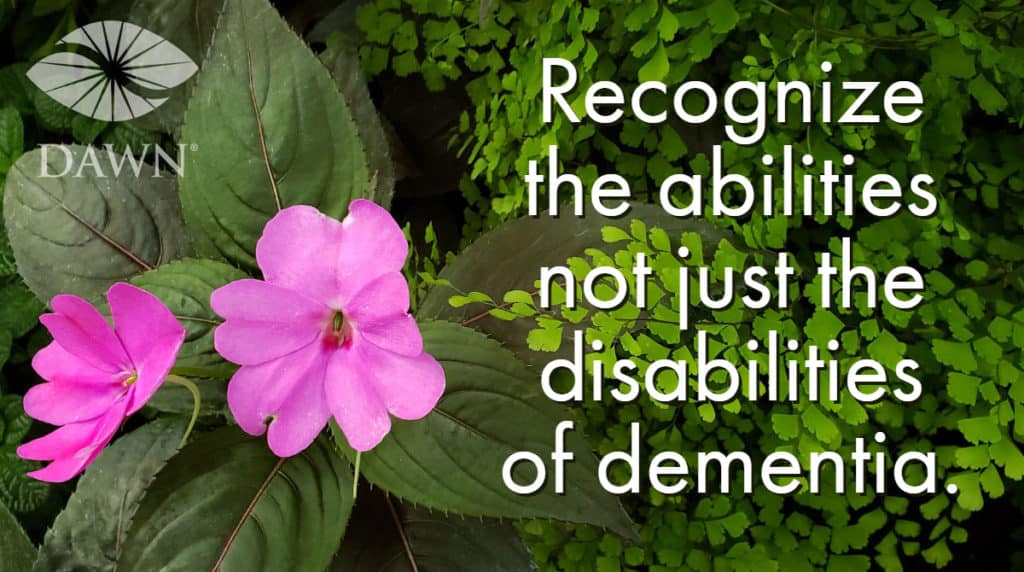
When we spend time with people who are experiencing dementia, we need to understand that when people lose cognitive skills they’ve been using their entire lives, they experience emotional pain. It is embarrassing, scary, and frustrating to find yourself becoming less able, whether it happens gradually or abruptly. And worse, if dementia is affecting the part of your brain that gives you self-knowledge, you won’t be able to perceive your own losses. It will seem that your companions are trying to trick you or are themselves making mistakes and blaming you.
I realized that dementia care could become easier—when I learned how to recognize and support my companion’s skills.”
Once I began to understand how to help my clients feel more successful and secure, they relaxed. We enjoyed companionship rather than struggle and conflict. They began to trust me. I realized that dementia care could become easier—when I learned how to recognize and support my companion’s skills. I stopped practicing law and began writing and teaching because I felt compelled to share what I’d learned about dementia from the people who know it best: those who are experiencing it.
The result was DAWN, and the DAWN Method, a strength-based approach to dementia care that focuses on teaching families and caregivers how to put habilitative, person-centered care into action. The DAWN Method is the sum of what my clients taught me. It is based upon two simple truths:
1—Dementia does not take away ALL our cognitive skills.
First, my clients taught me was that although dementia takes away some cognitive skills, it doesn’t take away all cognitive skills. Despite the magnitude of our losses to dementia, we keep the best and most necessary skills.
To explain dementia from this perspective of the skills we keep and lose, I wrote The Dementia Handbook—How To Provide Dementia Care At Home. In that little book, I explain the pattern of changes to our skills that dementia brings. From a medical perspective, there are far too many variables and types of dementia to see any patterns or predict any trajectories, but if we approach dementia from the perspective of changes to functioning, a pattern emerges. The simplest way to understand what is happening to our functioning when we begin to experience dementia is to think about our cognitive skills as three matched pairs:
Think about our cognitive skills as three matched pairs

Rational Thinking Skills & Intuitive Thinking Skills
First, our thinking skills change: we lose our secondary thinking skills (rational thinking) but not our primary thinking skills (intuitive thinking). In other words, we continue to receive information but lose the ability to make sense of it. From a functional perspective, this means that we become unable to follow a sequence (such as follow instructions), to see cause and effect (anticipate a result or understand why we should do something), or to prioritize ideas or actions (hurry, or understand that we should stop doing something). Of course, these losses cause a great deal of frustration for our companions—unless they understand that asking us to do what we cannot do simply sets us both up for failure and conflict, and begin using other techniques.

Experiential Selves & Remembering Selves
Second, our experience changes: dementia takes away our ability to drift into the past on memories or to feel at home (due to lost memory skills), and dementia takes away our ability to anticipate the future through planning or imagining (due to those lost rational skills). We become trapped in the present—simply experiencing the present equipped with neither past knowledge nor skills to interpret it. To borrow a concept from American Nobel Prize winner Daniel Kahneman, I describe this as losing our remembering selves and retaining our experiential selves. The key takeaway is this: once we understand that dementia leaves people fully experiencing the present and unable to visit the past or future, we realize that we can shape their present to help them feel safe and comfortable, despite dementia.

Attention Skills: Mindfulness & Mindlessness
And finally, our attention skills change: dementia takes away the ability to choose to maintain, redirect, or focus our attention. Something can still grab or hold our attention, but we have no control. And because we become unable to choose what to pay attention to, we lose the ability to focus and be mindful. We have trouble completing tasks and maintaining even basic self-care. But we don’t lose two valuable tools that live on in the absence of mindfulness: automatic thinking scripts and muscle memory. Even with dementia, we can perform tasks on autopilot—provided we are not interrupted or corrected, and are still living in the place we originally created the thinking scripts and muscle memories.
Knowing the strengths in dementia allows us, as dementia caregivers, to provide targeted support and kinder dementia care. We become able to avoid inadvertently causing our companions emotional distress. When we know what someone can still do and will continue to do, we become able to make better decisions regarding their welfare in a context where perfect solutions are scarce. This is my message in The Dementia Handbook.
2—Dementia causes specific emotional needs, which can be met.
Second, my clients taught me that once I understand the emotional needs caused by their cognitive losses, there are ways that I can respond to them and help them that increase their ability to succeed and lower the instances we find ourselves in conflict. In other words, instead of focusing on the situation (how do I get my loved one to take a shower/take medications/change clothes), I focus on their emotional state and respond to that need, and we accomplish more with less heartache.
My second book, Dementia With Dignity, through anecdotes and examples, explains how to identify the emotional reasons for someone’s behavior and provides techniques for resolving behaviors and refusals through meeting the emotional need before it translates into action. To me, this is the essence of person-centered care: to understand and satisfy the emotional needs that are causing someone to react negatively.
The essence of person-centered care: to understand and satisfy the emotional needs that are causing someone to react negatively.
I believe that unless we understand the skills not lost to dementia, and can recognize the person’s emotional state, we cannot provide truly habilitative, person-centered dementia care. We’ve been hearing more about ‘person-centered care’ now that the term has been endorsed by the CMS, and about meeting the well-being needs of people who are experiencing dementia. I’m thrilled. But person-centered care is only jargon unless we know how to put it into action. We must know what people can still do and how they’re feeling before we can support them. When I first began helping my neighbor across the street, it was widely believed in this country that dementia causes people to become crazy and that both physical and chemical restraints are reasonable treatments. Now we know that’s not true and that there are better ways. We now know there are skills people continue to use and that we can support them rather than restrain them.
I said earlier that when I stopped practicing law to help my neighbors, I began a journey of personal growth. I found that as I learned to recognize which cognitive skills my clients were becoming unable to use, I became more aware of the array of skills I have at my disposal. I came to realize that not only could I manage my own moods to avoid dampening theirs, I could choose to manage my moods whenever I wished. It was incredibly empowering to realize that I didn’t have to feel bad for hours due to a circumstance beyond my control. And, when I saw my clients’ instant emotional reactions to problems due to their lack of rational thinking skills, I realized that I could choose to use rational thinking at will and avoid wasting energy on negative feelings. And, when I began to understand how important our security symbols are to us whether we are experiencing dementia or not, I came to recognize my own and found I could meet them for myself. Understanding what we lose to dementia strengthened me.
When I teach classes, family members and caregivers tell me that they have experienced empowerment, too. They recount feeling more comfortable as a person. I know I do. Life is less stressful when we better understand which cognitive skills we have at our disposal and what skills our companions are using—whether dementia is a factor or not.
I’ve been accused of focusing on the needs of the person who’s experiencing dementia and ignoring the needs of the caregiver, but I believe that there is a paradox in caregiving that must be acknowledged. Like most difficulties that we meet in life, there is no way out but through. And only through focusing on another person’s needs do we gain a chance to grow and enrich our own lives, and find peace as we go through the experience.
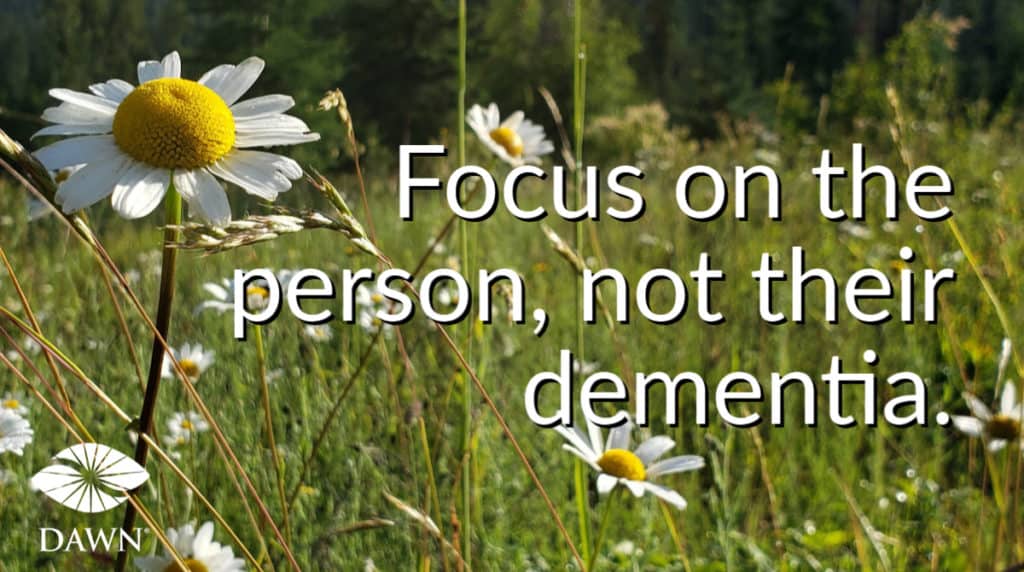
Caring for someone who’s experiencing dementia is difficult because people are complex. Dementia care is not simple; it’s not even merely complicated. It cannot be explained in a soundbite. Solving complex problems requires our humanity. It requires our awareness, attention, and empathy. But when we have a system—a metaphor or a pattern to follow—things that are complex become more doable. We begin to see a way through on a path we can follow. That’s what I set out to do for those families and caregivers who provide dementia care: to find a pattern that makes caring for someone who is experiencing dementia less stressful, a pattern that allows caregivers to be kinder.
So what is the Dementia & Alzheimer’s Wellbeing Network (DAWN) and the DAWN Method? Through books and dementia courses, we teach families and caregivers to recognize the skills not lost to dementia, and the emotional needs it causes. We believe that everyone—whether at home or working in a facility—can provide dementia care that is kind and truly supportive when they understand the skills not lost to dementia and the emotional needs it creates.
Copyright © 2020 Judy Cornish
§
Sign up for our newsletter and free video series
Sign up for our monthly newsletter and get more advice on how to help someone experiencing dementia. As a bonus, you’ll get our free video series, “Preparing for Dementia.”
